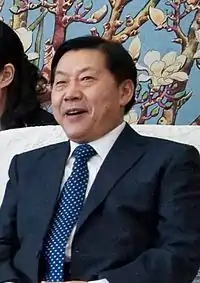Lu Wei (politician)
Lu Wei (simplified Chinese: 鲁炜; traditional Chinese: 魯煒; pinyin: Lǔ Weǐ; born January 1960) is a former Chinese politician. He served as the deputy head of the Propaganda Department of the Communist Party of China, the head of the General Office of the Central Leading Group for Internet Security and Informatization (one and the same with the Cyberspace Administration of China, CAC) from April 2013 to June 2016.[1] Lu was previously Vice-Mayor of Beijing and the head of the Beijing Party organization's propaganda department, among other posts.[2] Lu Wei was named by Time magazine as one of the world's 100 most influential people in 2015.[3]
Lu Wei | |
|---|---|
鲁炜 | |
 | |
| Director of the Cyberspace Administration of China | |
| In office April 2013 – June 2016 | |
| General secretary | Xi Jinping |
| Preceded by | Wang Chen |
| Succeeded by | Xu Lin |
| Vice-Mayor of Beijing | |
| In office March 2011 – April 2013 | |
| Mayor | Guo Jinlong → Wang Anshun |
| Personal details | |
| Born | January 1960 (age 61) Chaohu, Anhui, China |
| Political party | Chinese Communist Party (expelled) |
| Alma mater | Guangxi University of Radio and Television Renmin University of China |
| Occupation | Politician |
Biography
Lu was born in Chaohu, Anhui in January 1960.
In 1991, Lu worked in Xinhua News Agency of Guangxi province as the Deputy Director, he was promoted to become the Director in 1997.[4]
From 2001 to 2004, he rose through the ranks to become Deputy Director of Xinhua News Agency.[4]
In March 2011, Lu was appointed as the Vice-Mayor of Beijing, the Minister of Beijing Propaganda Department and a Standing Committee member of the Beijing Municipal Party Committee, he remained in that positions until April 2013, when he was appointed the Chairman of State Internet Information Office, the Vice-Chairman of State Council Information Office.
In August 2013, Lu convened a meeting to publicize the Chinese Dream, which was described by Chinese Communist Party General Secretary Xi Jinping, Charles Xue, Ji Lianhai, Pan Shiyi, Xu Shiping, Qi Xiangdong, Xu Xiaoping, Li Weining, Chen Li, Liao Hong, Gu Yongqiang, Chen Tong, Sun Jian, Hu Yanping, Gao Long, and Zhang Guoqing were invited to attend the meeting.[5][6]
Lu visited the United States during the first week of December 2014. In Washington, D.C. he conferred with senior administration officials such as the National Security Council about issues such as alleged Chinese hacking activities and censorship. In Silicon Valley he was greeted warmly by the top management of major firms such as Apple, Facebook, and eBay.[7]
Lu stepped down from his post at the Cyberspace Administration of China in June 2016, for unknown reasons. His departure was somewhat shocking because he had become a very visible member of Xi Jinping's inner circle. While Lu remained a deputy head of the propaganda department, he relinquished all other titles of import. Foreign media speculated that this might signal a shift in Chinese internet policy.[1] Lu was placed under investigation for corruption in November 2017, and he is the first official of provincial rank to be investigated for corruption following the 19th Party Congress.[8][3] He was expelled from the Communist Party in February 2018. The Central Commission for Discipline Inspection said Lu was “arbitrary and tyrannical”, abused his power for personal gain and pretended to follow the rules. Other offences included using all means to build personal fame, making false and anonymous accusations against others, deceiving the top Communist leadership, extreme disloyalty, duplicity, trading power for sex, improper discussion of the party and a lack of self-control.[9]
On October 19, 2018, the Ningbo Intermediate People's Court heard Lu Wei's bribery case. He took advantage of his position to seek benefit for others and accepted a large sum of money. Lu has been accused of bribing about 32 million yuan. He pleaded guilty to corruption in October.[10][11]On March 26, 2019, Lu was sentenced to 14 years in prison and fined three million yuan.
References
- "China's powerful internet tsar steps aside as another of Xi Jinping's close allies to take over". South China Morning Post. Retrieved 2016-06-29.
- "鲁炜担任国信办主任、国新办副主任". China. Retrieved 2013-05-01.
- Jiang, Steven (November 22, 2017). "China's former internet czar faces corruption probe". CNN.
- "观察站:揭示中共网络总管鲁炜的仕途之路". 多维新闻. 2013-05-12. Retrieved 2013-10-12.
- "Archived copy" "秦火火"们玩火自焚网上哪些言论会犯法?. 华商晨报 (in Chinese). 网易. Archived from the original on 2013-08-30. Retrieved 2013-08-25.CS1 maint: archived copy as title (link)
- "国信办主任鲁炜与网络"大V"畅谈社会责任". Xinhua (in Chinese). 新华网. Retrieved 2013-08-12.
- Paul Mozur (December 8, 2014). "Warm West Coast Reception for China's Web Czar (Chillier in Washington)" ("Bits" blog). The New York Times. The Times Company. Retrieved December 9, 2014.
- "中共中央宣传部原副部长鲁炜涉嫌严重违纪接受组织审查" (in Chinese). ccdi.gov.cn. 2017-11-21. Retrieved 2017-11-21.
- Tang, Frank (February 13, 2018). "China's 'tyrannical' former internet tsar Lu Wei accused of trading power for sex in long list of corruption charges". South China Morning Post.
- https://www.scmp.com/news/china/politics/article/2169329/chinas-former-internet-tsar-pleads-guilty-corruption
- 鲁炜受贿案一审开庭. sina (in Chinese). 2018-10-21.
共计折合人民币3200万余元。